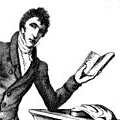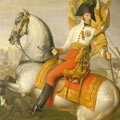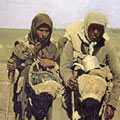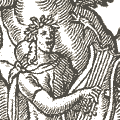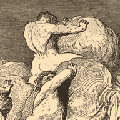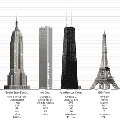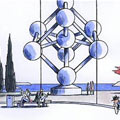De ziel als drieeenheid bij Plato
Bij Plato is de ziel het morele en intellectuele zelf, dit in onderscheid met de passies en lust c.q. plezier en allerlei zintuiglijke aspecten van het menselijk bestaan. Plato onderscheidt in zijn Faidros (Phaedrus 246A ff., 253C ff.) drie aspecten van de menselijke ziel die hij vergelijkt met een wagenmenner achter een tweespan. Zowel de menner als wel de twee (gevleugelde) paarden zijn onderdeel van de tripartite ziel Deze drie onderdelen zijn (in meerdere verschillende transcripties van veelal hetzelfde)
Bron: nl.wikipedia.org
Bron: nl.wikipedia.org
De menner, de logos of noes (nous) (intellect, het redenerende en kennende deel)
Het nobele paard, de thumos, thumoeides (passie, wil, doorzettingsvermogen)
Het weerspannige paard, epithumia, epithumetikon (trek, lust, driftleven)
 Of the nature of the soul, though her true form be ever a theme of large and more than mortal discourse, let me speak briefly, and in a figure. And let the figure be composite-‚¬â€a pair of winged horses and a charioteer. Now the winged horses and the charioteers of the gods are all of them noble and of noble descent, but those of other races are mixed; the human charioteer drives his in a pair; and one of them is noble and of noble breed, and the other is ignoble and of ignoble breed; and the driving of them of necessity gives a great deal of trouble to him. I will endeavour to explain to you in what way the mortal differs from the immortal creature. The soul in her totality has the care of inanimate being everywhere, and traverses the whole heaven in divers forms appearing-‚¬â€when perfect and fully winged she soars upward, and orders the whole world; whereas the imperfect soul, losing her wings and drooping in her flight at last settles on the solid ground-‚¬â€there, finding a home, she receives an earthly frame which appears to be self-moved, but is really moved by her power; and this composition of soul and body is called a living and mortal creature. For immortal no such union can be reasonably believed to be; although fancy, not having seen nor surely known the nature of God, may imagine an immortal creature having both a body and also a soul which are united throughout all time. Let that, however, be as God wills, and be spoken of acceptably to him. And now let us ask the reason why the soul loses her wings!
Of the nature of the soul, though her true form be ever a theme of large and more than mortal discourse, let me speak briefly, and in a figure. And let the figure be composite-‚¬â€a pair of winged horses and a charioteer. Now the winged horses and the charioteers of the gods are all of them noble and of noble descent, but those of other races are mixed; the human charioteer drives his in a pair; and one of them is noble and of noble breed, and the other is ignoble and of ignoble breed; and the driving of them of necessity gives a great deal of trouble to him. I will endeavour to explain to you in what way the mortal differs from the immortal creature. The soul in her totality has the care of inanimate being everywhere, and traverses the whole heaven in divers forms appearing-‚¬â€when perfect and fully winged she soars upward, and orders the whole world; whereas the imperfect soul, losing her wings and drooping in her flight at last settles on the solid ground-‚¬â€there, finding a home, she receives an earthly frame which appears to be self-moved, but is really moved by her power; and this composition of soul and body is called a living and mortal creature. For immortal no such union can be reasonably believed to be; although fancy, not having seen nor surely known the nature of God, may imagine an immortal creature having both a body and also a soul which are united throughout all time. Let that, however, be as God wills, and be spoken of acceptably to him. And now let us ask the reason why the soul loses her wings!Bron: Phaedrus

